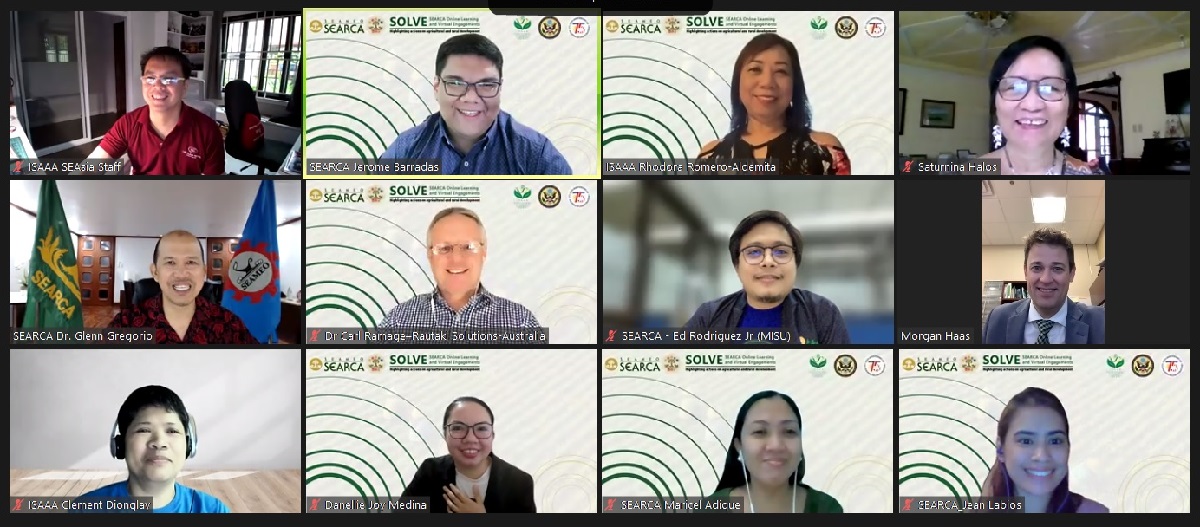
Experts Urge the Public to Support New Technologies to Address Agri Challenges and Climate Change
September 8, 2021| |
Scientific experts encouraged their fellow scientists and the public not to stop exploring methods to improve agriculture. This was highlighted during the webinar titled SOLVE Public Info-Sufficiency on Genome-Edited Crops, held on September 8, 2021, via Zoom.
The public webinar featured Dr. Carl Ramage of Rautaki Solutions Pty Ltd. and Chair of the Institutional Biosafety Committee of La Trobe University in Australia, and Dr. Saturnina Halos of the Biotech Coalition of the Philippines as resource speakers. The opening remarks were delivered by Mr. Morgan Haas, Agricultural Counselor of the USDA FAS of the US Embassy in Manila.
Dr. Ramage gave a presentation about the global status, policies and potentials of genome-edited crops. He gave an overview of the technology, and discussed the different regulatory approaches to its evaluation by different countries, particularly in South America and the US. Currently, there are significant opportunities for improved on-farm sustainability to address the challenges caused by climate change that also feature products beneficial to the human health. Lastly, the commercialization of genome-edited products will depend on three main points: a clear pathway to the market, an effective value capture model, and clarity around regulatory requirements and harmonization.
Dr. Halos, on the other hand, presented gene editing technology from the Philippine perspective. She first defined gene editing in the context of Philippine regulations then proceeded to discuss the technology's opportunities for the country, which included that its products will not be regulated by the existing guidelines covering living modified organisms, that the technology can help develop or improve new plant varieties and animal breeds sought after by farmers, and that molecular breeding using gene editing is a priority research area by the Department of Agriculture (DA) which in turn provides opportunities for scientists to apply for research funds for further studies. Dr. Halos also identified the challenges of the genome editing sector in the Philippines, which are being addressed by the DA by planning to establish a network of biotech centers where scientists can take their research and techniques further using better and modern facilities and develop new plant varieties, according to Dr. Halos.
After the presentations, questions from the audience were addressed. Topics such as the definition of genome editing, implementation of effective regulations, the potential risks of the technology and its products, and addressing organizations who are not in favor of genome editing and genetic modification were discussed. The speakers' take away messages were to encourage the public to participate and continue the discussions about new breeding innovations for the improvement of agriculture. These key messages were echoed by SEARCA Director Glenn B. Gregorio. "I am a farmer, a breeder, and a geneticist. I recognize the importance of science-based regulations. This (technology) is a game changer. Participants, let us use our experience (from this webinar) to be trailblazers for the farmers for their mindset to be transformed and for them to be more active in making this happen. The challenge is to spread the word and laymanize this technology so more people can understand and benefit from it," he said during his closing remarks.
The webinar was the last session of the Biotech Outreach Program on Genome Editing 2021 and was also part of the SEARCA Online Learning and Virtual Engagements (SOLVE). It was organized by SEARCA, ISAAA, and the US Department of Agriculture Foreign Agricultural Service (USDA FAS). Mr. Jerome Cayton Barradas, Project Coordinator II of SEARCA served as the moderator of the discussions. Watch the webinar on-demand on SEARCA's Facebook Page.
For more details, send an e-mail to knowledge.center@isaaa.org.
| |
You might also like:
- Technology Developers Share Commercialization Experiences with Filipino Scientists
- Philippines on the Right Path With Genome Editing Regulations
- Filipino Policymakers, Lawyers Tackle Genome Editing
Biotech Updates is a weekly newsletter of ISAAA, a not-for-profit organization. It is distributed for free to over 22,000 subscribers worldwide to inform them about the key developments in biosciences, especially in biotechnology. Your support will help us in our mission to feed the world with knowledge. You can help by donating as little as $10.
-
See more articles:
-
News from Around the World
- FAO Launches Global Initiative on One Country One Priority Product
- 2nd Pre-COPMOP2021: Asian Regional Workshop on Current and Upcoming Items Under the CBD and its Protocols
- Research Team Develops Plant that Produces More Oil
- Experts Urge the Public to Support New Technologies to Address Agri Challenges and Climate Change
- ICRISAT Researchers Identify Genes to Defend Chickpea Against Dry Root Rot
- Report Sets Out How the UK Could Take Lead in Shaping Regulation for Genetic Technologies
-
Research Highlights
- Study Finds Bt Cotton Does Not Affect NTO Agro-ecosystem Relations
- Research Shows Rice Enzyme OsUBC26 Vital for Blast Fungus Resistance
-
Plant
- Chinese Consumers Prefer Gene-edited Foods to Transgenics
- Experts Develop the Smallest CRISPR-Cas System for Genome Editing
- Wageningen University and Research Gives Away CRISPR Licences for Free in Fight Against Hunger
-
Health
- UC San Diego Nanoengineers Develop Fridge-Free COVID-19 Vaccines Grown in Plants and Bacteria
-
Read the latest: - Biotech Updates (February 11, 2026)
- Gene Editing Supplement (January 28, 2026)
- Gene Drive Supplement (February 22, 2023)
-
Subscribe to BU: - Share
- Tweet

